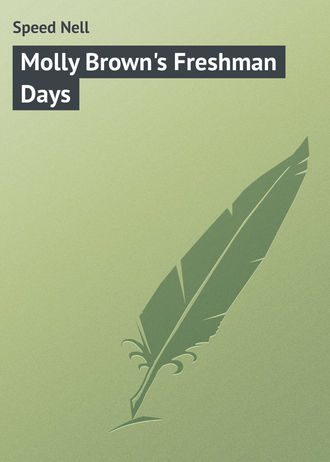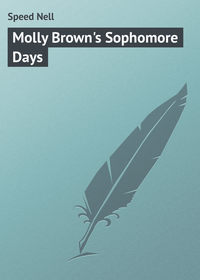 полная версия
полная версияMolly Brown's Freshman Days
“But what is it, Mabel? Don’t keep us in suspense,” cried Judy, always impatient.
“Well, there is evidence that someone was going to set fire to the gym. to-night,” she began, in a whisper. “This morning a bundle of oil-soaked rags was discovered in a closet, and then they began to search and found several other bundles like the first. There was a lot of excitement, and the Prex came over. They tried to keep it quiet, but the story leaked out, of course, and is still leaking – ” she smiled.
The girls exchanged horrified glances. What terrible disaster might not have befallen them if the rags had not been discovered?
“Of course it was the work of an insane person,” said Margaret Wakefield.
“Of course, but who? Is she one of the students or some outside person?”
With a common instinct, Judy and Nance looked up at the same moment. Their glances met. Without making a sound, Judy’s lips formed the word “Frances.”
“Is the dance to take place, then?” asked Jessie.
“Oh, yes. It’s all been hushed up and things will go on just as usual. I’m going to look on from the balcony. I shan’t mingle with the dancers, because they knock off my spectacles and generally upset my equilibrium.”
The door opened and Molly appeared in their midst like a gracefully angular wraith, for her face looked white, her shoulders drooped and her long slim arms hung down at her sides dejectedly.
“Why, Molly, dear, has anything happened to you?” cried Nance.
“No, I won’t say that nothing has happened,” answered Molly, sinking into a chair and resting her chin on her hand. “I have been put through an ordeal this day, why, I can never tell you, but I am glad you are all here so that I can tell you about it.”
They pressed about her, full of sympathy and friendliness, while Judy, who loved comfort and recognized the needs of the flesh under the most trying circumstances, lit Nance’s alcohol lamp and put on the kettle to make tea.
“But what is it?” they all demanded, seeing that Molly had fallen into a silence.
“I’ve been with the President for the last hour,” she said, “though for what reason I can’t explain. I can’t imagine why I was sent for and brought to her private office. She was very nice and kind. She asked me a lot of questions about myself and all of Queen’s girls. I was glad enough to answer them, because we have nothing to be ashamed of, have we, girls?” Molly rose and stood before them, spreading out her hands with a kind of deprecating gesture. The circle of faces before her almost seemed abashed under the steady gaze of her clear blue eyes. “It was a pleasure to tell her what nice girls were stopping at Queen’s Cottage.”
“Did she mention?” began Judy and pointed to the dividing wall of the next room.
“Oh, yes, I was coming to that. But what do I know about – ” Mollie stopped short and caught her breath. Her eyes turned towards the door, which was opened softly. There stood Frances Andrews.
She had evidently just come in, for she still wore her sweater and tam o’ shanter, and brought with her the smell of the fresh piney air.
“It’s all right about your escort for to-night, Miss Brown. You are to go with Miss Stewart, who has got special privilege from the sophomore president to take you. Good-bye. I hope you’ll have a ripping time. I shan’t see you at supper. I’m going off on the 6.15 train and won’t be back until Sunday night.”
There was such a tense feeling in the circle of freshmen as Frances stood there, that, as Judy remarked afterwards, they almost crackled with electricity.
It was quite late, and as most of the girls intended to dress for the party before supper, they took their departure immediately without any comment.
“Is anything special the matter?” asked Molly, after they had gone and she was left alone with her friends.
They told her the strange story which Mabel Hinton had reported to them a little while before.
“But that is the work of a lunatic,” exclaimed Molly, horrified.
“And I suppose,” went on Nance, “that the reason Prexy sent for you was that she suspected a certain person, who shall be nameless, and she was told that you were the only person who had ever been nice to her, and furthermore that you were going to the dance with her.”
“Of course that must be the reason,” said Molly, “and of course it’s absurd, I mean suspecting Frances Andrews. She might be accused of many things, but she is certainly in her right mind. She’s much cleverer than lots of the girls in her class.”
“Clever, yes. But should you call her balanced?”
Molly did not answer. She felt anxious and frightened, and a rap on the door at that moment made her jump with nervousness. It proved to be one of the maids of the house with two boxes of flowers, both for Molly. One was pink roses and contained the card of Mary Stewart, and the other was violets, and contained no card whatever.
She divided the violets in half and made her two friends wear them that night to the dance.
CHAPTER X
JOKES AND CROAKS
“I’m beginning to feel that we shall issue happily out of all our troubles,” cried Judy Kean, bursting into her friends’ room without knocking, “and the reason why I feel that way is because when I am clothed in silk attire my soul is clothed in joy. Especially when there’s dancing to follow. Button me up, someone, please, so that I may take a good look at my resplendent form in your mirror. I can’t see more than a square inch of neck in my own two by four.”
The girls stood back to admire their friend, who indulged her artistic fancy in rather theatrical clothes much too old for her, but who usually succeeded in gaining the effect she sought.
“Dear me, ‘she walks in beauty like the night,’” said Molly laughing. “You look like a charming and very youthful widow-lady, Judy, but how comes it you are wearing black?”
“Black is for certain types,” replied Judy sagely, “and I am one of them. Next to black my bilious skin takes on a dazzling, creamy tint and my mouse-colored hair assumes a yellow glint that is not its own.”
The girls laughed at their erratic friend, who was, indeed, dressed in black chiffon, from the fluffy folds of which her vivacious young face glowed like a flower.
“If you object to me, wait until you see Jessie,” cried Judy. “She might be going to the opera, she is so fine. She is wearing pink satin that glistens all over like a Christmas tree with little shiny things.”
As a matter of fact, Nance, whose well balanced and correct tastes in most things rarely failed her, was the most suitably dressed of our girls, in her pretty white lingerie frock.
At eight o’clock that evening Molly rolled away luxuriously in a village hack with Mary Stewart, holding her roses tenderly and carefully under her gray eiderdown cape, so as not to crush them.
“I’m awfully glad I was so lucky as to draw you this evening, Molly,” the older girl was saying.
“I’m the lucky one,” answered Molly, her thoughts reverting to the strange discovery of the morning. “Oh, Miss Stewart, what did Frances Andrews do last year to get herself into such a mess and be frozen out by all her class this year?”
“I’ll tell you perhaps some day, but not to-night. We want to enjoy ourselves to-night. Can you guide, Molly?”
“Like a streak. I always guided at home at the school dances, because I was the tallest girl in my class.”
“I’m a guider, too,” laughed Mary, “and when two guiders come together, I imagine it’s a good deal like a tug of war.”
During the ride over to the gymnasium, neither of the girls mentioned the thing uppermost in their minds: the attempt to set the gymnasium on fire that night. Nor was the rumor referred to by anyone at the dance later. It was a strictly forbidden topic, the President herself having issued orders.
The great room was a mass of foliage and bunting, Japanese lanterns and incandescent lights in many colors, and it was really quite a brilliant affair according to Molly’s notions, who had never seen anything but small country dances usually given at the schoolhouse several miles from her home. Lovely music floated from behind a screen of palms and lovely girls floated on the floor in couples, to the strains of the latest waltz.
“I’m afraid I’m going to be an awful wallflower,” thought Molly, feeling suddenly overgrown and awkward in the midst of this swirling mass of grace and beauty. “I can’t help feeling queer and I don’t seem to recognize anybody.”
But Molly had plenty of partners that evening, and after that first delightful waltz, it was nearly an hour before she caught a glimpse of Mary Stewart again in the crowd of dancers.
“Isn’t it jolly?” called Judy, as they dashed past each other in a romping barn dance.
“I never thought I could have such a good time at a manless party,” Jessie Lynch confided to Molly while they rested against the wall later. “But, really, it’s quite as good fun.”
“Isn’t it?” replied Molly. “I think I never had a better time in my life. But I’m afraid our roommates and friends are not enjoying it very much,” she added ruefully, pointing to the gallery, where seated in a silent bored row were Margaret Wakefield, Nance Oldham and Mabel Hinton.
“Of course,” said Jessie, “you would never expect Mabel to join this mad throng, but I’m surprised at Nance and Margaret.”
“Margaret prefers conversation parties, I suppose, and Nance is not fond of dancing, either. She would always rather look on, she says.”
The two girls were standing near the musicians and from the other side of the screen of palms they now heard a voice say:
“Have you danced with the fantastic Empress Josephine as yet?”
“Not as yet,” came the answer with a laugh. “But be careful, she is near – ”
Molly moved away hastily, her face crimson.
Jessie had heard the question also and recognized the voice of Judith Blount.
“Why, Molly,” she exclaimed, glancing at her face, “you don’t think they meant – ”
“Yes,” said Molly, trying to smile naturally, “I do.”
She glanced down at her home-made dress. Perhaps it did look amateurish. She and Nance had worked very hard over it, but, after all, they were not experienced dressmakers.
“Why, you look perfectly charming,” went on Jessie generously. “The color is exactly right for you – ”
“Yes, color,” answered Molly, “but there ought to be something besides color to a dress, you know. Never mind, I shouldn’t be such a sensitive plant, Jessie. One ought not to mind being called fantastic. It’s not nearly so bad as being called – well, malicious – cruel. I’d rather be fantastic than any of those things. But I did think the dress was pretty when we made it.”
“Come along, and let’s get some lemonade, Molly. Your dress is sweet and suits you exactly, so there.”
Then someone came up and claimed Jessie for the next dance, but Molly was grateful to the pretty butterfly creature for her assurances and she resolved to forget all about her dress. As she lingered in the corner, uncertain whether to stay where she was or join her friends in the gallery, Mary Stewart made her way through the crowd and called:
“Oh, here you are. Some of the seniors are just outside and want to meet you. Will you come?”
“I should think I would,” replied Molly, joyfully. Fantastic, or not, she had one good friend among the older girls.
“This is Miss Molly Brown of Kentucky,” announced Mary Stewart presently to a dozen august seniors who shook her hand and began asking her questions.
“We had two reasons for wanting to meet you, Miss Brown,” here put in a very handsome big girl, who spoke in an authoritative tone, which made everybody stop and listen. (She was, in fact, the President of the senior class.) “One of course was just to make your acquaintance, and the other was to ask if you would do us a favor. We are going to have a living picture show Friday week for the benefit of the Students’ Fund, and we wondered if you would pose in one of the pictures, maybe several, we haven’t decided on them yet. But that dress must be in one of them, don’t you think so, Mary? One of Romney’s Lady Hamilton pictures for instance, with a white gauze fichu; or a Sir Thomas Lawrence portrait – ”
“You don’t think it’s too fantastic?” asked Molly.
“What, that lovely blue thing? Heavens, no! it’s charming – ”
Molly had barely time to thank her and accept the invitation, when she and Mary were dragged off to make up the big circle of “right and left all around,” which wound up the dance. After this whirling romp, three loud raps were heard and gradually the noise of talking and laughter subsided into absolute silence. A girl had mounted the platform. She carried a megaphone in one hand and a book in the other. She was the official reader of her class, and now proceeded to recite through the megaphone all the best and most amusing material from “Jokes & Croaks.” According to time honored custom, the jokes were greeted with applause and laughter, and the croaks with groans and laughter, and anybody who groaned at a joke or applauded a croak, if she happened to be caught, was publicly humiliated by being made to stand up and face the jeers of the multitude. The girls finally decided, after many ludicrous mistakes, that the jokes were on the sophomores and the croaks were on the freshmen. For instance, here was a croak:
“A lady of notable luck,Who cared not for turkey or duck,Cried, ‘Give me old hamAnd I don’t give a slam,If it comes from Vermont or Kaintuck.’”This was greeted with laughing groans, and Molly for the first time realized the significance of her roommate’s name.
Margaret Wakefield figured in several croaks, as “the Suffragette of Queen’s.” In fact Queen’s girls came in for a good many croaks and began to wait fearfully for what was to come next. But the witticisms were all quite good-natured, even the last, which called forth so many merry groans that they soon ceased to be groans at all and became uproarious laughter, and Molly, very red and laughing, too, was the centre of all eyes. This was the croak:
“They have locked me in the Cloisters,They have fastened up the gate!Oh, let me out; Oh, let me out.It’s getting very late.’Tis said the ghosts of classes goneDo wander here at night.Oh, let me out; Oh, let me out,Before I die of fright!And then there rang a clarion voice.It’s tone was loud and clear.‘Oh, dry your eyes and cease your cries,For help, I ween, is near.But promise me one little thingBefore I ope the gate:Oh, never pass the coffee tray,If I am sitting nigh;Or, if you pass the coffee tray,Oh, then, just pass me by!’”It was all very jolly and delightful, and for the first time the girls felt that they were really a part of the college life.
Mary Stewart was very sweet to Molly when she took her home that night, and the young freshman never realized until long afterwards, when she was a senior herself, what a nice thing her friend had done; for sophomore-freshman receptions were an old story to Mary Stewart.
CHAPTER XI
EXMOOR COLLEGE
Busy days followed the sophomore-freshman ball. The girls were “getting into line,” as Judy variously expressed it; “showing their mettle; and putting on steam for the winter’s work.” The story of the incendiary had been reported exaggerated and had gradually died out altogether. Frances Andrews had returned to college, more brazenly facetious than ever, breaking into conversations, loudly interrupting, making jokes which no one laughed at except Molly and Judy out of charity. She was a strange girl and led a lonely life, but she was too much like the crater of a sleeping volcano, which might shoot off unexpectedly at any moment, and most of the girls gave her a wide berth.
The weather grew cold and crisp. There was a smell of smoke in the air from burning leaves and from the chimneys of the faculty homes wherein wood fires glowed cheerfully.
At last Saturday arrived. It was the day of the excursion to Exmoor, and it was with more or less anxiety regarding the weather that the three girls scanned the skies that morning for signs of rain. But the heavens were a deep and cloudless blue and the air mildly caressing, neither too cold nor too warm.
“It is like the Indian summers we have at home,” exclaimed Molly, when, an hour later, they turned their faces toward the village through which the trolley passed.
Mabel Hinton, passing them as they started, had called out:
“Art off on a picnic?”
And they had answered:
“We art.”
Some other girls had cried:
“Whither away so early, Oh?”
And they had cried:
“To Exmoor! To Exmoor, for now the day has come at last!” paraphrasing a song Judy was in the habit of singing.
Indeed the day seemed so perfect and joyous that they could hardly keep from singing aloud instead of just humming when they boarded the trolley car.
Through the country they sped swiftly. The valley unfolded itself before them in all its beauty and the misty blue hills in the distance seemed to draw nearer. Over everything there was a sense of autumn peace which comes when the world is drowsing off into his deep sleep.
“Exmoor!” called the conductor at last, and the three girls stepped off at a charming rustic station. With a clang of the bell which rang out harshly in the still air, the car flew on.
The three girls looked at the empty station. Then they looked at each other with a kind of mock consternation, for nothing really mattered.
“Where is Dodo?” asked Judy, with the smile of the victor, since she had predicted only a few moments before that Dodo might by this time have become so frightened at his boldness that he would suddenly become extinct like his namesake, the dodo-bird.
“Well, if Dodo is really extinct,” said Molly, “we’ll just take a little walk back through the fields. Epiménides thought nothing of it. He expects to walk to-day and meet us at lunch.”
But Dodo was not extinct that morning, and they beheld him now running down the steep road as fast as his heavy boots could carry him.
“Behold, his spirit has risen from its fossil remains and he now walks among us in the guise of a man,” chanted Judy.
“Don’t make us laugh, Judy, just as the poor soul arrives without enough breath to apologize,” said Nance, and the next instant the embarrassed young man stood before them blushing and stammering as if he had been caught in the act of picking a pocket or committing some other slight crime which required explanation.
“I’m terribly sorry – have you waited long? – the schedule was changed – I didn’t know – you should have come half an hour later – I don’t mean that – I mean I wasn’t ready – ” he broke off in an agony of embarrassment and the girls burst out laughing.
“Don’t you be caring,” said Judy. “We’re here and nothing else really matters.”
“I shouldn’t have thought the station of a man’s college could be so deserted,” observed Molly, looking about the empty place.
Dodo assured her that plenty of people would be there in half an hour, when the train arrived; just then everybody was either in the village on the other side of the buildings, or down on the football grounds watching the morning practice game. There was to be a real game that afternoon.
“You see, it’s only a small college,” he went on. “There are only two hundred and fifty in all. The standards are so high it’s rather hard to get in, but we are heavily endowed and can afford to keep up the standards,” he added proudly.
They climbed the road to the college almost in silence and in ten minutes emerged on a level elevation or table land which commanded a view of the entire countryside. Here stood the college buildings, built of red brick, seasoned and mellowed with time. They were a beautiful and dignified group of buildings, and there was a decidedly old world atmosphere about the place and the campus with splendid elm trees. Molly had once heard Judith Blount refer to Exmoor as that “one-horse, old-fashioned little college,” and she was not prepared for anything so fine and impressive as this.
Nor was she prepared for the surprise of Miss Green, sister of Professor Edwin and Dodo. The girls had pictured her a middle-aged spinster, having heard she was older than the Professor himself, who seemed a thousand to them. And here, waiting for them, in the living room of the Chapter House, was a very charming and girlish young woman with Edwin’s brown eyes and cleft chin and George’s blonde hair; the ease and graciousness of one brother and the youthful fairness of the other. She had come down from New York the night before especially to meet them, she said.
Rather an expensive trip, they thought, for one day’s pleasure, since it took about seven hours and meant usually one meal and of course at night a berth on the sleeper.
“At first I thought I couldn’t manage it for this week,” she continued, “but Edwin was so insistent and no one has ever been known to refuse him anything he really wanted.”
Edwin! But why Edwin? Why not the youthful and blushing Dodo? So Molly wondered, while they were conducted over the entire college; the beautiful little Gothic chapel with its stained glass windows; through the splendid old library which was much smaller than the one at Wellington, but much more “atmospheric” as Judy had remarked; then through the dormitories where they remained discreetly in the corridors, and finally back to the Chapter House, in which George lodged with some thirty schoolmates.
There on the piazza was Professor Edwin Green waiting for them. He had made an early start, he said, and walked the whole distance in less than three hours. Some other young men came up and were introduced, and the entire gay party, Nance shyly sticking closely beside Miss Green, went off to view the village, which was a quaint old place well worth visiting, they were told.
The train had evidently come in, and crowds of people were hurrying up the road. There was a sound of a horn and a coach dashed in sight filled with students wearing crimson streamers in their buttonholes.
“It’s a crowd of Repton fellows come over to see their team licked,” George explained, “but look, Edwin, here comes Dickie Blount. I thought he was in Chicago.”
“Evidently he isn’t,” said the Professor, his eyes smiling, his mouth serious. It was Richard Blount, the hero of the ham bone, and he straightway attached himself to Molly and declined to leave her side for the rest of the day.
“Don’t tell me that that delightful, joking, jolly person is brother to Judith,” whispered Judy in Molly’s ear.
Molly nodded.
“There’s no family resemblance, but it’s true, nevertheless.”
Motor cars and carriages of all varieties now began to arrive. The whole countryside had turned out to see the great game between the two local college teams, and the Wellington girls pinned green rosettes in their buttonholes to signify that their sympathies were all for Exmoor.
“It’s the most exciting, jolliest time I ever had in all my life,” cried Molly to Professor Green, who walked on her other side. “And to think I have never seen a football game before in all my life.”
“I must draw a diagram for you and show you what some of the plays are, or you will be in a muddle,” said the Professor, looking at her gravely, almost, as Molly thought, as if she were one of his English Literature pupils.
At lunch, according to the etiquette of the place, George and his guests were placed at the senior table. There was no smoking nor loud talking and the students behaved themselves most decorously, although George confided to Judy that ordinarily pandemonium prevailed.
After lunch they started for the grounds in a triumphal procession; for our Wellington freshmen and their chaperone had an escort of at least four or five young men apiece. Nance looked bewildered and shy and happy; Judy was never more sparkling nor prettier, and Molly was in her gayest, brightest humor.
They had hardly left the Chapter House behind them and proceeded in a snake-like procession across the campus, when a black and prancing, though rather bony, steed dashed up bearing a young lady in a faultlessly fitting riding habit. It was Judith Blount.
Nobody looked particularly thrilled at Judith’s appearance, not even Judith’s brother, and Judy almost exclaimed out loud:
“Bother! Why couldn’t she stay at home just once?”
“How do you do, Cousin Grace?” called Judith from her perch. “I heard you were going to be down and I couldn’t resist riding over to see you.”









